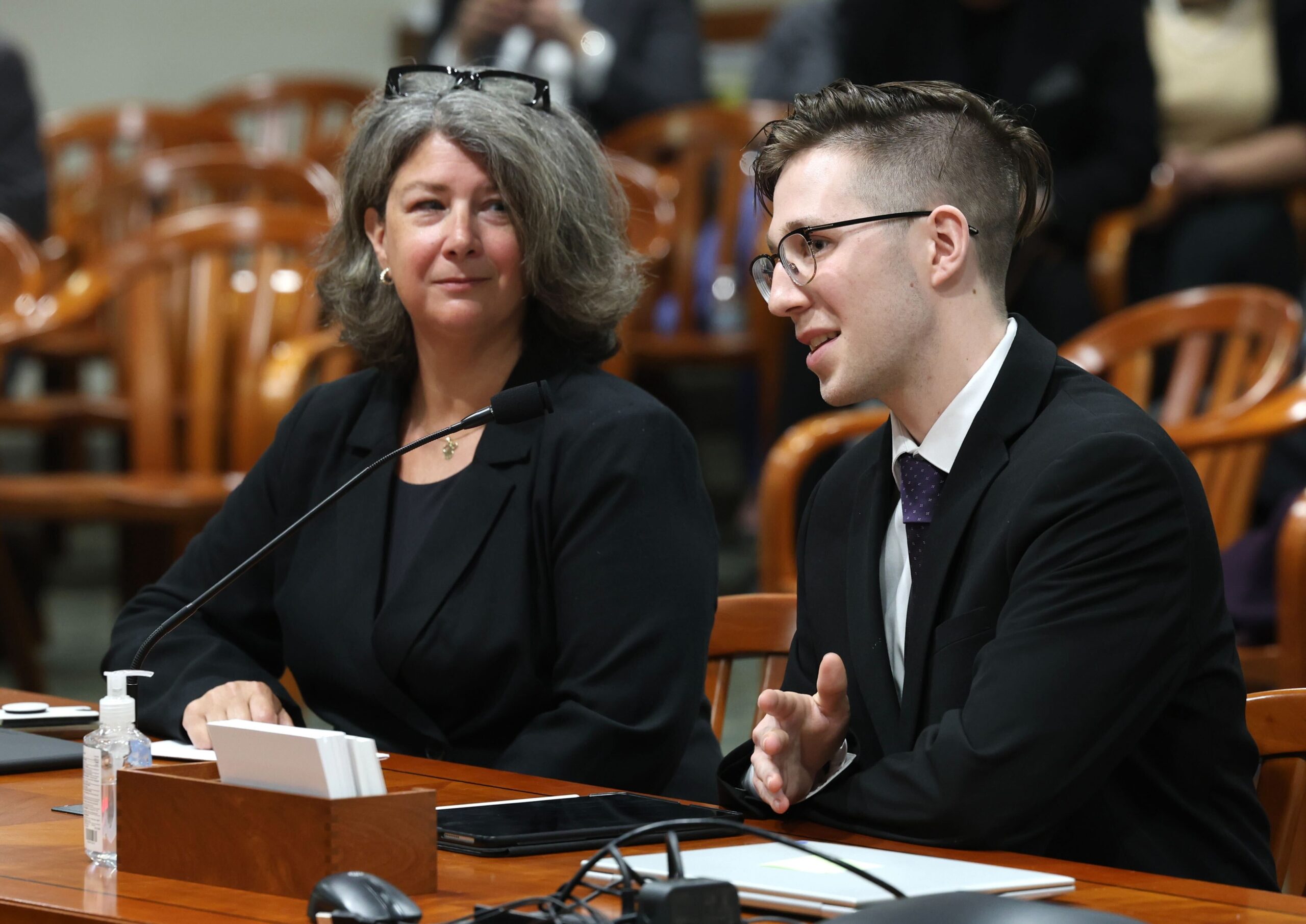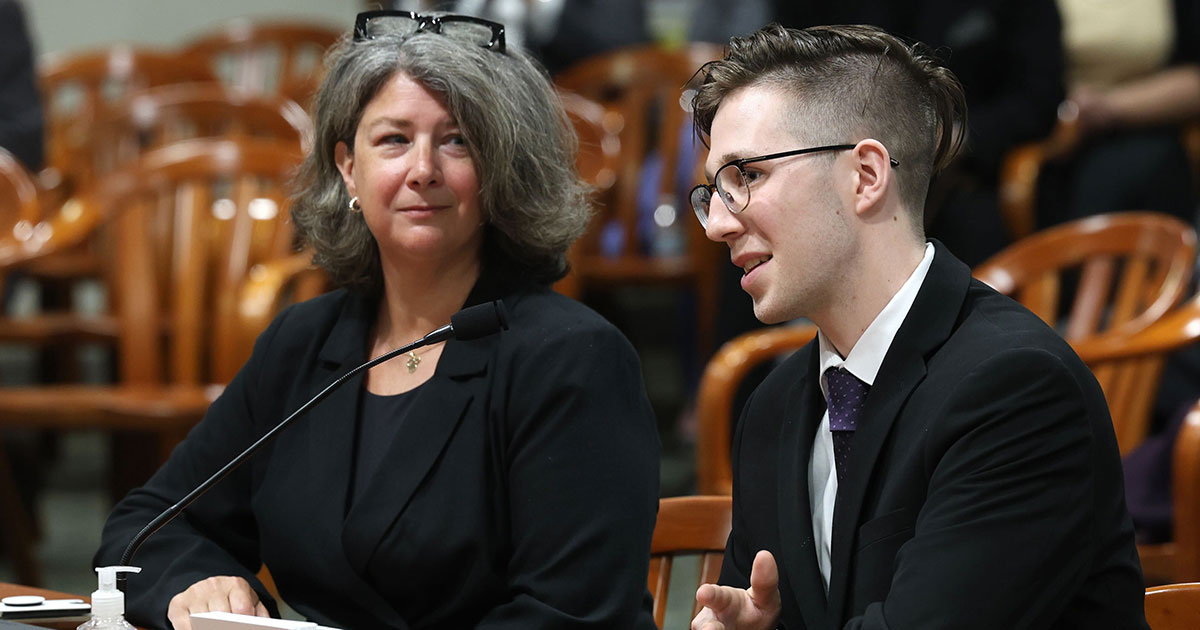
Alex Bowerson (right), cardiac survivor and heart safe schools advocate, speaks in support of the bills on March 5, 2024 during a House Committee on Regulatory Reform hearing in Lansing.
LANSING, Mich., March 5, 2024 — State Reps. John Fitzgerald (D-Wyoming) and Tyrone Carter (D-Detroit) introduced House Bills 5527 and 5528 last week, aimed at preventing deaths due to sudden cardiac arrest in schools. The bill package would improve school safety by requiring schools to develop cardiac emergency response plans, offer training and access to automated external defibrillators (AEDs), which are used to help those with heart issues. Today, the House Regulatory Reform Committee held a hearing on the legislation.
“I saw it firsthand during my time in the NFL — ensuring access to AEDs can be nothing short of lifesaving,” said Speaker Joe Tate (D-Detroit). “Sudden cardiac arrests can be experienced by anyone, including children and young adults. Student-athletes are more than 3.5 times more likely to experience sudden cardiac arrest than non-athletes. These bills put our most precious resource first — our people.”
Currently, 23 states have AED school requirements, with varying degrees of specificity regarding mandates on whether schools must have AEDs on campus and provide the necessary training on their use. Sudden cardiac arrest (SCA) is a life-threatening emergency caused by a malfunction in the heart’s electrical system. Sudden cardiac arrests claim the lives of more than 300 Michigan children, teens and adults ages 1 to 39 years old annually. Survival rates from SCA more than double when a bystander uses a publicly available AED as compared to waiting for the arrival of emergency responders.
“I am a cardiac arrest survivor and was resuscitated with CPR and an AED in my high school. If AEDs were not in my school, I wouldn’t be here today. That is a scary reality to think about, but it’s the truth. All schools in Michigan need to have AEDs, so that students like me — but also teachers, parents and community members — all will have a chance of survival like I did,” said Alex Bowerson, cardiac survivor and advocate for HEARTSafe Schools.
Sudden cardiac arrest can strike anyone regardless of age or physical fitness,” Fitzgerald said. “We have seen too many instances where quick access to an AED could have saved a life. These common-sense bills seek to do just that, helping to protect student-athletes, their families, and school employees. I look forward to working with my colleagues to see these bills signed into law.”
While expanded access to AEDs can save the lives of many students — teachers, families, mentors and many others stand to benefit from this school safety measure. There are about 7 million teachers and non-academic staff in U.S. public schools on any given day. Parents, grandparents, coaches, administrators and other visitors who frequent sporting events also benefit from having these devices available. Heart disease is still the leading cause of death in America. Having additional AEDs at sporting events and near classrooms will support those with risks of heart conditions.
“Heart conditions all too often go undetected, and we find out too late that our loved ones are in danger,” Carter said. “Sports provide children and teens with many benefits — increased self-esteem, better grades and improved physical health. They provide opportunities to build communities and friendships. Parents and grandparents at schools get to see their kids excel and achieve great feats. Simply put, sports set up kids for future success. Our bills help to protect student-athletes and prevent untimely deaths.”
The Michigan Department of Health and Human Services recently began the MI HEART Safe School Award program, the only state with such an initiative. This designation recognizes a school’s efforts to prevent sudden cardiac death of the young and prepare for a cardiac emergency. The program is supported by a number of stakeholders, including Project ADAM, a nationwide initiative that has saved the lives of children, adolescents and adults who went into sudden cardiac arrest.
“Sadly, sudden cardiac arrest does happen in young people — it is uncommon, but it does happen. That’s why it is so critical to have a planned response ready to go in case of a sudden and unexpected cardiac distress. In conjunction with CPR, being equipped with an AED can double and even triple a child’s chance of survival. So it goes without saying that schools should absolutely be required to have AEDs on hand — it can be the difference between life and death,” said Dr. Alyssa Vermeulen, medical director of Project ADAM Michigan.
The NFL has taken a proactive stance to promote safety and prevent fatal outcomes from SCA among high school student-athletes. It has founded the Smart Heart Sports Coalition, which collaborates with organizations like the NBA, MLB, MLS, NHL, NCAA, American Heart Association, American Red Cross, Korey Stringer Institute, National Athletic Trainers’ Association and Damar Hamlin’s Chasing M’s Foundation
“We are encouraged by the state’s efforts to improve AED access in schools and on sports fields across Michigan,” said Detroit Lions President and CEO Rod Wood. “AEDs and proper CPR training saves lives and should be a constant point of emphasis in our schools to ensure our students can learn and play sports safely.”
“No one can predict when or where a cardiac arrest will occur, which is exactly why it is so important that an AED be readily available in public spaces, such as in schools. Having the AED quickly analyze the heart rhythm and provide a lifesaving shock, when the AED senses it’s needed, is crucial. There is no doubt that Michigan students will be safer if schools are equipped with AEDs. It’s been conclusively shown that timely CPR and AED use, facilitated by having a practiced plan for recognizing an event and calling 9-1-1, saves lives,” said Dr. Monica Goble, a retired Michigan pediatric cardiologist.
“Cardiac emergency response plans will ensure schools, school athletic facilities, and events have the tools and resources to respond to a cardiac emergency, and provide guidance around placement, maintenance, and use of an AED. Additionally, we want to ensure all coaches are trained in CPR and AED use,” said Cindie DeWolf, Mission Advancement Advisor for the American Heart Association. “We know CPR, if performed immediately, can double, or triple a person’s chance of survival. In schools with AEDs, approximately 70% of children survive cardiac arrest — seven times the overall survival rate for children. Having individuals trained in cardiac emergency response can make a big difference, especially in rural areas of Michigan, where time may elapse between when EMS can arrive to assist. Every life lost is one too many, and these bills will save lives.”
###

